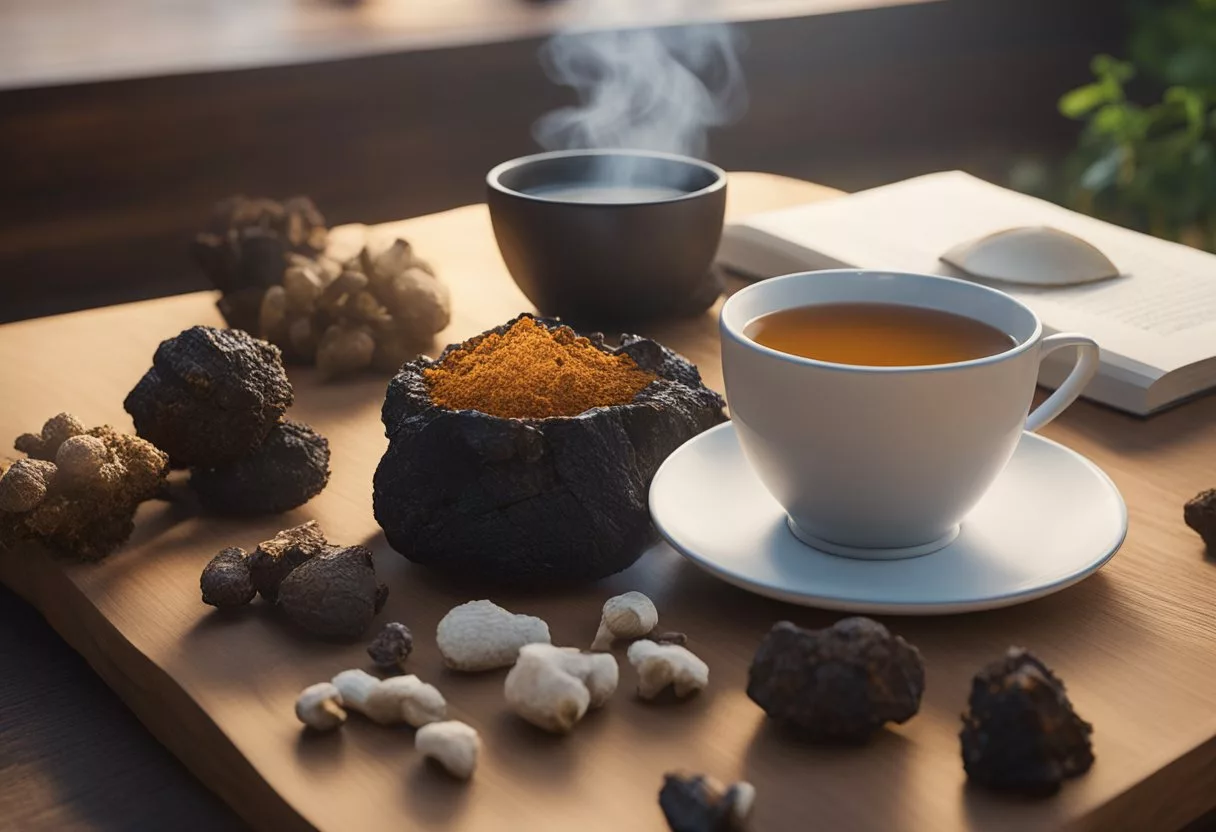Chaga mushroom tea, made from the Inonotus obliquus fungus that grows on birch trees, has been traditionally used by various cultures for its potential health benefits. This tea is known for its ability to boost the immune system, fight inflammation, and even lower blood sugar and cholesterol levels. With its growing popularity, many are curious about what makes this drink so special.

Chaga mushrooms are rich in antioxidants and are often considered a medicinal marvel. Beyond the antioxidants, chaga tea also contains several other beneficial compounds like betulinic acid and polysaccharides that help reduce inflammation and promote overall health. Those interested in natural remedies often turn to chaga because of its potential cancer-fighting properties.
For those looking to try chaga tea, preparation is simple yet important. Avoid boiling the water to retain its antioxidant properties. Instead, simmer the chaga chunks in water for at least 15 minutes for a flavorful and health-boosting drink. Finding quality chaga products can enhance the tea experience, ensuring that the health benefits are maximized.
Key Takeaways
- Chaga mushroom tea boosts the immune system and reduces inflammation.
- It contains antioxidants and other beneficial compounds like betulinic acid.
- Proper preparation involves simmering, not boiling, to preserve antioxidants.
Historical Background and Geographic Origin

Chaga mushroom, renowned for its medicinal properties, grows primarily on birch trees. This unique fungus has a long history of traditional use, particularly in Siberia and Northern Europe, impacting various cultures.
Traditional Use in Siberia and Northern Europe
In Siberia, Chaga mushroom is often called the “Mushroom of Immortality.” It has been used for centuries due to its believed health benefits. People in this region brewed Chaga into teas to boost immunity, combat fatigue, and enhance overall well-being.
During the 16th century, Chaga’s use spread throughout Eastern Europe. In Russia, it was incorporated into folk and botanical medicine. These societies recognized its potential as a remedy for various ailments, using it for digestive issues, immune support, and overall vitality. The continuous use in these regions highlights its significance in traditional medicinal practices.
Chaga in Different Cultures
Chaga holds a revered place in many cultures. In North America, indigenous people have utilized Chaga for centuries. The First Nations communities used it to treat different health conditions and as a traditional remedy.
In Siberian culture, Chaga was embedded in their myths and folklore. This mushroom was believed to extend life, hence its nickname “Mushroom of Immortality.” In Northern Europe, Chaga was a staple in folk medicines, reflecting its wide use and importance across diverse cultures.
The recognition and adaptation of Chaga across these cultures underscore its long-standing value and multifaceted applications. Whether in Siberia, Northern Europe, or North America, Chaga’s rich history demonstrates its integral role in traditional medicine globally.
Scientific Overview of Chaga Mushrooms

Chaga mushrooms, known for their health benefits, grow on birch trees and contain various bioactive compounds. They are rich in nutrients like polysaccharides, antioxidants, and fiber which contribute to their medicinal properties.
Classification and Physical Description
Chaga mushrooms (Inonotus obliquus) belong to the Hymenochaetaceae family. They primarily grow on birch trees found in cold northern climates. The mushroom’s exterior looks like burnt charcoal with an orange-brown interior.
They measure up to 50 cm in length, attaching themselves to the tree. They feed on the tree’s nutrients, forming a hard, woody growth called a conk. These mushrooms are used in teas and supplements due to their health properties.
Chaga’s Compounds and Nutritional Profile
Chaga mushrooms contain several vital compounds such as polysaccharides, beta-glucans, and betulinic acid. These compounds give chaga its reputation for boosting the immune system and fighting inflammation.
Other significant nutrients include:
- Antioxidants like polyphenols, which protect cells from damage.
- Dietary fiber, aiding in digestion.
- Various vitamins and minerals supporting overall health.
Polyphenols and flavonoids add to chaga’s antioxidant capacity. Consuming chaga in tea or powder form offers an easy way to harness these benefits.
The mushroom’s unique combination of nutrients makes it a valuable addition to a healthy diet.
Health Benefits and Medicinal Properties

Chaga mushroom tea offers various health benefits. These include boosting the immune system, fighting cancer and tumors, balancing blood sugar levels, reducing inflammation, and supporting cardiovascular health.
Immune System Enhancement
Chaga mushrooms are known to boost the immune system. They contain beta-glucans, which enhance the production of certain immune cells. This helps the body defend against infections and diseases.
The mushrooms also have high levels of antioxidants. These substances help reduce oxidative stress in the body, which can weaken immunity over time. Drinking Chaga tea regularly may support a stronger and more active immune response.
Anticancer and Antitumor Activities
Chaga mushrooms have shown promise in fighting cancer. Their extract is high in compounds that can inhibit the growth of cancer cells. Some studies suggest that these mushrooms can slow the progression of certain tumors.
The high antioxidant content helps protect cells from damage that might lead to cancer. Although more research is needed, Chaga tea is often considered a complementary approach to traditional cancer treatments.
Balancing Blood Sugar Levels
For those with diabetes or blood sugar concerns, Chaga mushrooms may be beneficial. The mushrooms have been linked to lower blood sugar levels. This makes them a good option for people looking to manage their diabetes naturally.
Regular consumption of Chaga tea can help in maintaining balanced blood sugar levels. The tea works by improving insulin sensitivity and reducing glucose levels in the blood.
Anti-inflammatory Effects
Chaga mushrooms possess significant anti-inflammatory properties. Inflammation is the body’s natural response to injury, but chronic inflammation can lead to various health issues, including heart disease and arthritis.
The antioxidants in Chaga mushrooms, such as ergosterol and betulinic acid, help reduce inflammation. This makes Chaga tea a useful beverage for those looking to mitigate inflammatory conditions.
Supporting Cardiovascular Health
Chaga tea contributes to supporting cardiovascular health. The mushrooms have the ability to lower cholesterol levels. High cholesterol is a risk factor for heart disease.
The antioxidants in Chaga mushrooms combat oxidative stress, which can damage heart tissues. By lowering cholesterol and reducing oxidative stress, Chaga tea may help keep the heart healthy and reduce the risk of heart disease.
How to Prepare and Use Chaga Tea

Chaga mushroom tea can be prepared in various ways using chunks, powder, or tinctures. Each method has its benefits and yields a tea with a distinct taste, often described as mild and earthy.
Step-by-Step Brewing Instructions
To make chaga tea, start by selecting chaga chunks or powder. If using chunks, break them into 1-inch pieces. Add 4 to 5 chunks to a pot with 4 cups of water. Bring to a simmer, ensuring the heat is low. Simmer for at least 15 minutes for a mild flavor or up to 1 hour for a stronger brew.
Using powder accelerates the process. Break a 10-gram piece of chaga into powder and add 1 to 2 teaspoons to a tea infuser. Add 12 ounces of hot water and steep for 4 to 6 minutes. After simmering or steeping, strain the tea to remove the chaga pieces.
Consumption Tips and Best Practices
For the best experience, serve chaga tea hot. Drinking it freshly strained maintains its warm, soothing properties. Store any leftover tea in the refrigerator and reheat it gently on the stove. Avoid boiling to protect the antioxidants.
Chaga tea is often consumed plain, but adding honey or lemon can enhance its flavor. Some may use chaga tinctures added to other beverages like coffee for a different taste. Ensure to enjoy chaga tea in moderation and consult with a health professional if unsure about daily consumption limits.
Possible Side Effects and Interactions

Consuming chaga mushroom tea can have potential side effects and interactions with certain health conditions and medications. It’s important for individuals to be aware of these considerations before including chaga mushroom tea in their diet.
Considerations for Specific Health Conditions
Individuals with kidney disease should be cautious when consuming chaga mushroom tea. Chaga contains high levels of oxalates, which can contribute to kidney stones. High oxalate content may pose risks for those already prone to kidney stones.
Chaga may also have blood-thinning properties. Those with bleeding disorders or who are taking blood-thinning medication might experience increased bleeding risks. It is advised for these individuals to consult with a healthcare provider before using chaga.
Diabetes patients need to be careful as well. Chaga may affect blood sugar levels. Therefore, monitoring is necessary to avoid unexpected changes. Combining chaga intake with diabetes medications can further complicate blood sugar management.
Interactions With Medications
Chaga mushroom tea can interact with certain medications. It may enhance the effects of blood-thinning medications such as warfarin, increasing the risk of bleeding. Those on blood thinners should be particularly cautious and seek medical advice.
Additionally, chaga could affect insulin and other diabetes medications. Since chaga may lower blood sugar, it is vital to monitor blood sugar levels closely to prevent hypoglycemia. Adjustments to diabetes medication dosages might be necessary.
Chaga’s impact on the immune system could also interfere with immunosuppressive drugs. Individuals on these types of medications should get professional medical advice before consuming chaga tea, as interactions can potentially reduce the effectiveness of these drugs.
Shopping Guide: Finding Quality Chaga Products

Choosing the right Chaga products involves understanding how to distinguish authentic Chaga from imitations and knowing the various sources and forms available.
Distinguishing Authentic Chaga
Authentic Chaga, also known as Cinder Conk, offers numerous health benefits. When shopping for Chaga products, look for these key indicators of authenticity:
- Origin: Genuine Chaga is typically harvested from wild birch trees in cold regions like Siberia, Canada, and Northern Europe.
- Appearance: Real Chaga has a dark, rough exterior and a vibrant orange-brown interior.
- Ingredients: Ensure products list only 100% pure Chaga, without fillers or artificial additives.
Reputable sources will often provide information about the harvesting process and the region of origin. Trustworthy brands may also offer lab test results to assure buyers of the purity and quality of their products.
Sources and Forms of Chaga
Chaga is available in various forms to suit different needs and preferences. Here are some common types:
- Chaga Extract: This concentrated form is convenient for those looking to add Chaga to their diet easily. Extracts are available in liquid dropper bottles for precise dosing.
- Herbal Tea: Chaga tea can be found in tea bags or loose powder. Opt for products made with 100% pure Chaga powder for the best results.
- Supplements: Chaga capsules or pills are ideal for people seeking a no-fuss way to consume this medicinal mushroom. Brands like Host Defense offer high-quality options.
- Raw chunks: Sayan Chaga provides bulk raw Chaga, which is ideal for those who prepare large amounts of Chaga tea or tinctures.
Buying from a reputable source that specializes in Chaga ensures you get a genuine product. Many online retailers, such as Chaga HQ, offer a variety of Chaga products and provide detailed descriptions to help you make an informed choice.
FAQs and Common Misconceptions

Chaga mushroom tea offers numerous health benefits, such as providing antioxidants and supporting immune function. However, there are also some common questions and misconceptions about its use and effectiveness.
Addressing Common Questions
What are the health benefits of Chaga tea?
Chaga mushroom tea is known for its high antioxidant content, which can help fight inflammation. It also contains vitamins and minerals like B vitamins, calcium, and potassium, which support overall health.
Can Chaga tea help with diabetes?
Some people believe Chaga tea can help manage diabetes. While there are studies suggesting it may help regulate blood sugar levels, the FDA has not approved Chaga mushroom for diabetes treatment.
Is Chaga tea bitter?
The taste of Chaga tea can be somewhat bitter to some people, but others find it earthy and mild. Adding honey or a sweetener can enhance its flavor.
Debunking Myths About Chaga
Can Chaga tea cure cancer?
Although some research indicates that Chaga mushrooms might help in fighting cancer cells, it is not a cure for cancer. Always follow medical advice and treatments prescribed by healthcare professionals.
Is alcohol extraction better for Chaga’s benefits?
Both hot water and alcohol extractions can be used to release Chaga’s nutrients. Hot water extraction is particularly effective in preserving its antioxidant properties. You can also find premade powders and capsules with these extractions already done.
Are there any side effects of using Chaga?
While generally safe, consuming Chaga in large dosages may lead to side effects like digestive issues. Always consult with a healthcare provider for appropriate usage, especially if you have preexisting conditions or are on medication.
Frequently Asked Questions

Chaga mushroom tea is valued for its numerous health benefits, but it’s important to know how to prepare it correctly and understand any potential side effects or contraindications. Here are some common questions with detailed answers about Chaga mushroom tea.
What are the health benefits of consuming Chaga mushroom tea?
Chaga mushroom tea contains antioxidants that help lower oxidative stress. It is a good source of B vitamins, minerals like calcium, iron, zinc, and magnesium, as well as amino acids and fiber. Consuming it regularly may boost immune function and overall health.
Can you provide a recipe for making Chaga mushroom tea?
To make Chaga mushroom tea, break the Chaga mushroom into small pieces. Grind one 10-gram piece into a powder. Place 1 to 2 teaspoons of the powder in a tea infuser and add about 400 milliliters (roughly 12 ounces) of hot water. Let it steep for a few minutes before drinking.
Are there any side effects associated with drinking Chaga mushroom tea?
While Chaga mushroom tea is generally safe, some people might experience side effects like stomach upset or an allergic reaction. It’s always wise to start with a small amount to see how your body reacts.
What are the contraindications for the consumption of Chaga tea?
Individuals with autoimmune diseases or those taking diabetes medication or blood thinners should be cautious. Chaga might interact with these conditions or medications, potentially causing adverse effects.
How might Chaga mushroom tea affect liver function?
Chaga mushroom tea has potent antioxidants that could benefit liver health by reducing oxidative stress and inflammation. However, those with liver conditions or concerns should consult a healthcare provider before adding it to their regimen.
Where can one purchase high-quality Chaga mushroom tea?
High-quality Chaga mushroom tea can be purchased from health food stores and specialized online retailers. Look for products that are organic and sourced from birch trees, as Chaga grown on grains might lack some nutrients. Ensure the product is free from pesticides and other contaminants.